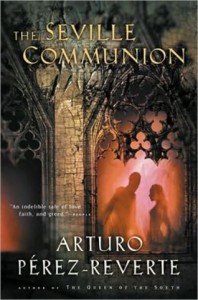Home »

Perez-Reverte surprising in this novel
Book Review
By Derryll White
Perez-Reverte, Arturo (1998). The Seville Communion
“Only the setting is true. Nobody could event a city like Seville.”
 I picked this novel up and the first thing I saw was mention of the Pope. Oh god, I thought, I hope Perez-Reverte hasn’t been infected by the Dan Brown virus and the obscene rape and plunder of the Vatican. ‘The Flanders Panel’ was such a good and different novel, elusive and richly-textured, that I wanted to see what else this author was up to. The Pope’s e-mail being hacked was a signal that things were a little different in this story.
I picked this novel up and the first thing I saw was mention of the Pope. Oh god, I thought, I hope Perez-Reverte hasn’t been infected by the Dan Brown virus and the obscene rape and plunder of the Vatican. ‘The Flanders Panel’ was such a good and different novel, elusive and richly-textured, that I wanted to see what else this author was up to. The Pope’s e-mail being hacked was a signal that things were a little different in this story.
I am not a Catholic or a Mason. The history of Spain from the Armada through the Inquisition has seemingly been written in blood, laced with intrigue, and always fascinating to me. That intrigue has continued through the disappearance of my favourite poet, Frederico Garcia Lorca, an Andalusian familiar with Seville. He disappeared and was declared dead during the Spanish Civil War. When Perez-Reverte starts, about 10 pages into this novel, talking about a new and modern Inquisition emanating from the Vatican – I am all eyes and ears. I know he is a careful writer and I can at least anticipate a thorough and beautiful tour of Seville.
I got confused in this novel and had to do some research. I had thought that the Knights Templar, the forerunners of the Masonic order, were opposed to Catholicism. So when Father Quart, the main character who is cast as a soldier emissary from Rome, held as his image of courage and honour a Knight Templar resting on his sword I thought the author had this wrong. In doing some reading I found out that in 1187 the Christian Crusader forces were wiped out by Islamic warriors at the Battle of Hattic. Following that the Knights Templar were officially endorsed by the Catholic Church around 1129 A.D., but were then disbanded by Pope Clement V in 1312.
Perez-Reverte sustains an amazing sense of Seville, its mysteries and boundless surprise. The images he creates are marvelous and will cause any reader to seriously consider the call to visit. This is a captivating and fairly modern, 20th Century view of a majestic European city. And it is also much more than that with bold characters and large themes.
I am not a believer in the omniscient embodied power in the sky, whether male or female. I take my soul’s direction from nature and from others who grace me with their kindnesses, their inclusive gestures, the kiss of their eyes and minds. But given all that, Perez-Reverte makes me appreciate, for perhaps the first time, the solace and quietude believers can receive from a church devoid of greed, power, acquisitiveness. He is very good at creating believable scenes that draw the reader into the calmness of the Latin liturgy, the timelessness of shared sacred practice. He really does surprise me in this novel, often.
“Can you smell the jasmine?”
What jasmine? There isn’t any.”
“The jasmine that used to be here in the old days.”
Antonio Burgos ‘Seville’.
Excerpts from the novel:
HACKERS – Hackers liked attention. They were mostly teenage boys surfing The Net for ever harder systems to crack. Microchip junkies, tech addicts, getting their kicks trying to break into Chase Manhattan Bank, the Pentagon, or the Vatican.
CHARITY – In the Curio, favors are forgotten and slightly remembered. We live in a court of tattling eunuchs, where promotion comes only with the support of others. Everyone rushes to stab a fallen man, but otherwise nobody dares to do anything.
PERCEPTIONS – “Three centuries old,” she said. Their steps echoed as they walked past the pews toward the high altar. “Where I come from a three-hundred-year-old building would be a historical jewel that no one could touch. But around here there are lots of places like this falling into ruin. And nobody lifts a finger.”
SOUL – “Always beware of an old man who clings to an idea. It’s so rare to reach old age with any ideas one is passionate about. Only a lucky few won’t have them snatched away.”
RELIGION – This was old-style religion, with a priest in a cassock intoning mass in Latin, the vital link between man and the great mysteries. A church of faith and solace, when cathedrals, gothic windows, baroque altarpieces, images and paintings depicting the glory of God served the same purpose as television screens nowadays: to reassure man confronted with the horror of his own solitude, death and the void.
CATHOLICISM – “From Our Holy Mother the Church,” he said at last. “So Catholic, Apostolic, and Roman that it’s ended up betraying its original purpose. In the Reformation it lost half of Europe, and in the eighteenth century it excommunicated Reason. A hundred years later, it lost the workers because they realized it was on the side of the masters and oppressors. And now, as this century draws to a close, it’s losing the young and the women. Do you know how this will end? With mice running around empty pews.”
FAITH – Faith doesn’t even need the existence of God. It’s a blind leap into a pair of welcoming arms. It’s solace in the face of senseless fear and suffering. The child’s trust in the hand that leads out of darkness.
CREDO – His lucidity was like a silent curse. It prevented him from totally accepting the natural order of things but gave him nothing in return to make such clarity of mind bearable. For a priest, as in any other walk of life that required a belief in the myth that man held a privileged position in the universe, such a lucidity was awkward and dangerous, for it said that human life was totally insignificant. In Quart’s case, only willpower, expressed as self-discipline, offered protection from the naked truth that gave rise to weakness or apathy or despair.
DUENDE – Because La Niña Puñales embodied the cante and the copia, and Spain itself. Not the Spain of cheap flamenco for tourists but the other Spain, the real Spain, the legend redolent of smoky bars, green eyes, and the sweat of a lifetime. The dramatic memory of a people that sang to relieve its sorrows and exorcize its demons by desperately clutching knives.”
KNOWLEDGE – “When I was young,” he said suddenly, “I read all the philosophers of Antiquity, from Socrates to Saint Augustine. And I forgot them. The only thing that remained of them was bittersweet melancholy and disillusionment. Now I’m sixty-four, and all I know about people is that they remember, they’re afraid and they die.”
MEMORY – “Memories give you some security; you know who you are and where you’re going. Or where you’re not going. Without them you’re at the mercy of the first person who comes along and calls you daughter,”
WOMEN – Because it was written: she will destroy your heart and your will. The exquisite, innocent destructive power of a woman always left her lover the lucidity to understand his defeat. Quart was left facing himself, deprived forever of alibis.
– Derryll White once wrote books but now chooses to read and write about them. When not reading he writes history for the web at www.basininstitute.org.”







